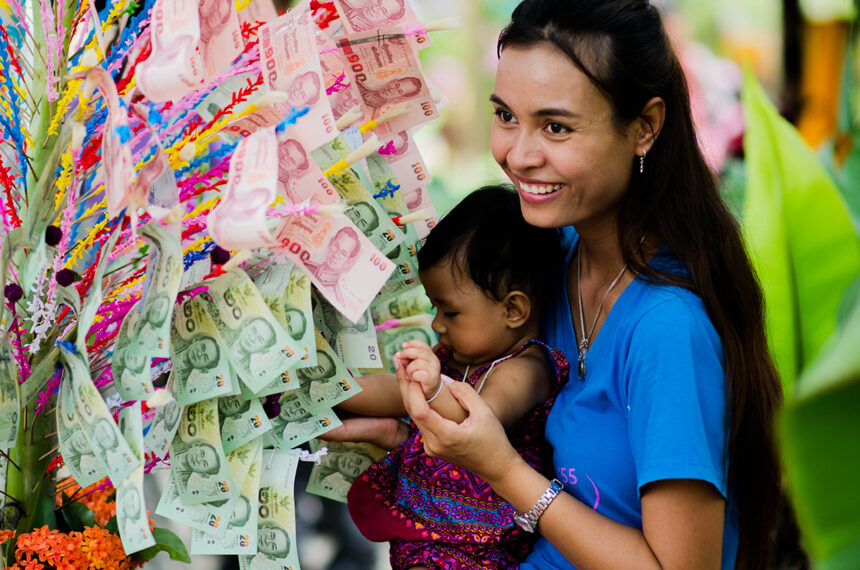BANGKOK — In Bangkok’s buzzing sois and Isaan’s fields, many Thai women still picture prams, bedtime songs, and family meals. They talk about motherhood with warmth and certainty. Yet Thailand’s birth rate has sunk to a new low, now at 0.89 children per woman, second only to South Korea. A growing number say they want children, but cannot find partners they trust enough to build a family with.
This tension sits at the core of the population slide. Births fell under 500,000 last year, the first time since 1949, and could drop below 400,000 in 2025. The population has edged down from 66 million in 2021 to 65.95 million.
Thailand is racing toward super-aged status faster than any neighbour in Southeast Asia. Analysts warn the workforce could shrink from 37 million today to about 22 million in 50 years. Behind the grim forecasts lie stories of hope colliding with hard reality, as many women see parenthood as a dream, yet struggle to find a partner who shares the load.
Consider Nongnuch, 35, a marketing professional in central Bangkok. Over iced coffee, she scrolls through profiles with cautious optimism. She grew up with a mother who poured love into family life, and she wants that for herself. She says many men are glued to their phones, buy into mia noi culture, or sidestep responsibility.

Thai Women Lack Suitors
She is far from alone. A Thailand Development Research Institute survey found 63 percent of Thai women aged 25 to 40 want children, yet 88 percent rated the lack of a suitable partner as a major barrier. Better welfare support could shift decisions, they say, but only if the right partner is in place.
The story repeats across provinces and age groups. In Chiang Mai, Pimlarp, 28, teaches primary school and raises her five-year-old son with help from her parents. She left a short marriage after gambling debts overwhelmed the home.
She would still like another child, but only with someone who treats parenting as shared joy, not unpaid labour. Thailand’s divorce rate has climbed to one in three marriages. Many women cite cheating, chronic absence, and poor support as deal-breakers.
The data is stark. Thailand’s total fertility rate has plunged since the 1980s, from well above replacement level to around 1.0 today, lower than Japan’s 1.2. Bangkok is the toughest place to start a family, with a fertility rate of 0.63. Rates in parts of Isaan are higher, around 1.7 among some non-
Thai-speaking groups, but single motherhood is common. An estimated 5 to 7 percent of households are led by single mothers, close to India and below the global average of 14 percent. The picture is likely worse than it looks, since many children live with grandparents after their fathers leave, and women piece together low-paid work with childcare.
Why do so many Thai women say there are no good men to partner with? The gap is not about headcount, since women only slightly outnumber men. It is about behaviour, expectations, and trust. Dr Chalermpol Chamchan of Mahidol University’s Institute for Population and Social Research says many men prize personal freedom over family duty.

Marriage Age Increasing
Alcohol abuse, gambling, and affairs wear down relationships. Today’s women are better educated, earn their own income, and expect fairness. They are less willing to compromise on respect and shared effort. Female labour force participation sits around 60 percent.
That progress has a side effect, since many women marry later. The average age of first marriage has risen from about 21 in the 1990s to closer to 28, when fertility starts to decline.
Money strains make the gap wider. The cost of raising a child has soared, from school fees to health care and housing, while wages lag. A TDRI estimate puts the cost of raising one child to age 18 at more than 2 million baht, a heavy lift for middle-income families.
Paid maternity leave is capped at 98 days, which is short by regional standards. Many mothers go back to work early. Economist Sasiwimon Paweenawat at Thammasat University says women weigh the bills and career risk carefully. Some men still expect old roles without taking on emotional and household work.
Cultural habits also bite. The mia noi tradition persists, with surveys showing high levels of infidelity among married men. Virginity and purity are still policed, which hurts divorced women and single mothers. Many Thai men avoid dating women with children.
Online forums gripe that foreign men are more open to dating single mums, while local men shy away. Families often blame the woman if a relationship fails, not the man who left. That double standard feeds a spiral of reluctance and mistrust.
Single motherhood is rising fast. Under the government’s newborn support scheme, new registrations by single mothers jumped 15 percent in 2025 data. Many cases come from unstable relationships and unplanned pregnancies.

Birth Slump Crisis
Herbary Cheung, author of Single Mothers in Thailand, says surviving for the child becomes the priority. Stigma cuts across class, ethnicity, and health status. In parts of Isaan, poverty and teen pregnancy go hand in hand. Some fathers move to cities or overseas, leaving grandparents to step in.
Social media gives these frustrations a loud channel. On X, Thai women share threads under hashtags like #ThaiWomenWantKidsBut, joking that eligible men are ghosts. Posts cite the TDRI numbers and spark replies about bars, drinks, and fragile egos. Celebrities add to the debate.
Actor Tul Pakorn spoke about family support for his same-sex relationship and the pressure all couples face when thinking about children.
This is not just a private struggle; it is a national test. A Mahidol poll of over 1,000 adults aged 28 and above found 71 percent see the birth slump as a crisis, but only 35 percent plan to have children. The state’s Having Children for the Nation campaign offers cash and perks.
Demographers say payments help only when trust and fairness exist at home. Real change would include longer paid maternity leave, paid paternity leave, flexible work, fair pay, and public campaigns that reject stigma. Some propose granting residency to the children of migrant workers to boost the youth population.
There are green shoots. Dating apps such as TrulyThai link locals with foreigners, with some women finding partners who accept single mothers. Critics call it ATM hunting, yet many see it as a route to stability.
Campaigns for new models of masculinity are gathering support, urging men to split chores, show up at clinics, and value care work. In Chiang Mai, single-mother networks help with jobs, childcare swaps, and legal advice, turning support into confidence.
Back in Bangkok, Nongnuch matches with a profile that promises an equal partnership. She says she will keep her standards, keep trying, and have children only on fair terms. Her resolve mirrors that of many Thai women.
If men step up and policy keeps pace, the lullaby might return to Thai homes. If not, the cradles will stay still, and the silence will say the rest.














